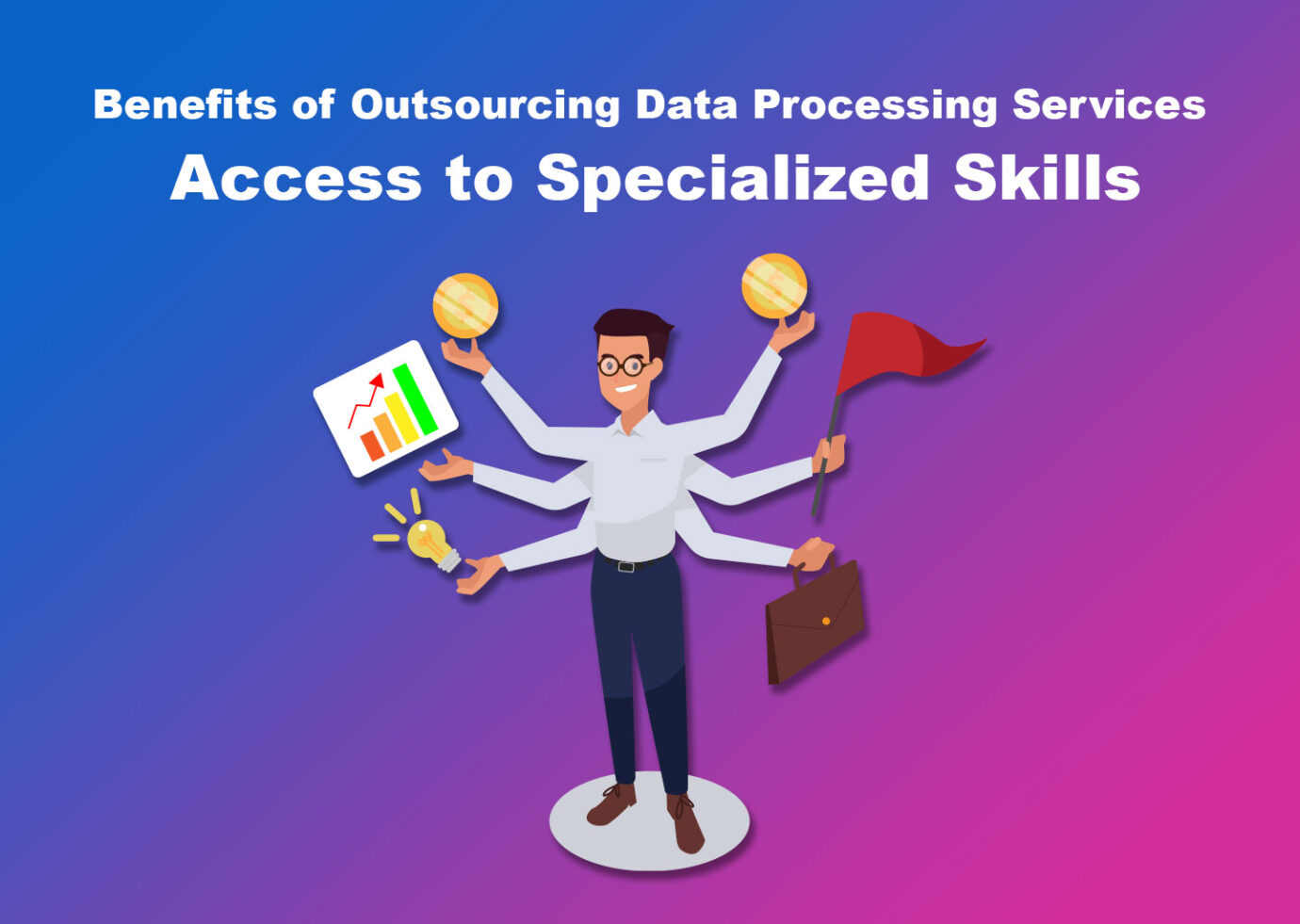Data entry and processing may be easy, but they require a lot of time to complete. In-house employees can do this job, but they may need to gain expertise to finish it smoothly and quickly.
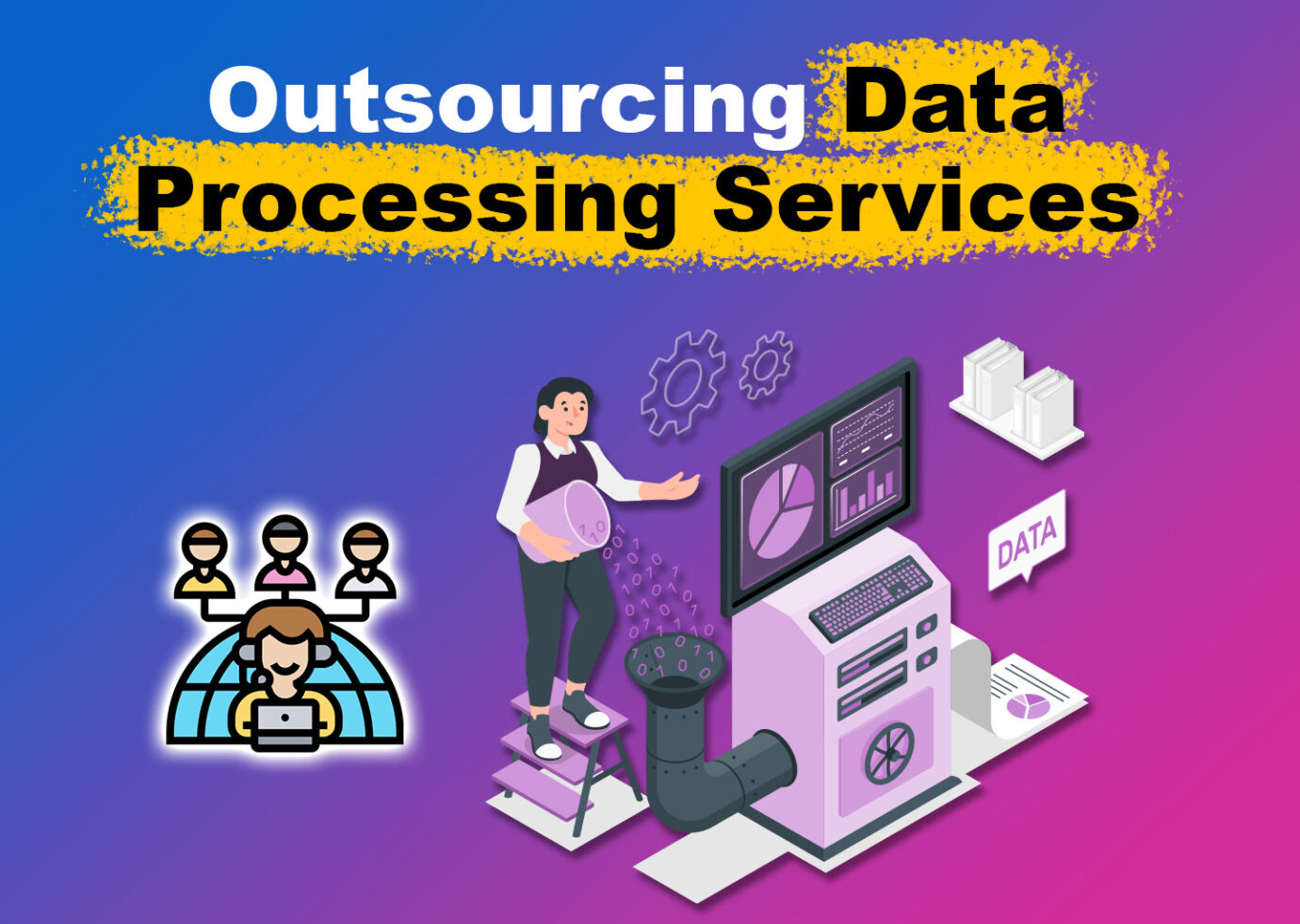
Organizations need efficient data capture for every department to prevent errors that may lead to loss of profit – something that you can achieve with an expert data processor. Fortunately, this business need can be fulfilled by outsourcing data processing services.
This article will discuss everything you need to know about data entry outsourcing services.
Can You Outsource Data Entry & Processing Tasks?
Yes, you can outsource data entry and processing tasks. It’s an effective solution for businesses without the expertise or resources to handle data entry in-house. The process involves hiring an external company or individual to collect your company’s data.
You don’t need to disclose more information than necessary to your outsourced data entry employee, allowing you to protect sensitive information while getting jobs done. These people are data management experts, so they can efficiently collect data.
4 Benefits of Outsourcing Data Processing Services
Here are four benefits that a business may get from outsourcing data processing services:
- Practicality.
Outsourcing data entry and processing to an external company or team is more cost-effective than maintaining an in-house team. You only need to pay for these people when you need their service instead of bearing the cost of someone full-time. -
Access to Specialized Skills.
Data entry service providers are experts in data management. This allows them to complete the job more accurately and quickly than hiring full-time staff.
- Scalability.
Outsourcing lets businesses scale their data entry and processing needs up or down when workloads change. This way, they do not need to hire or lay off employees whenever their data management needs increase or fluctuate. - Increased Productivity.
When businesses outsource non-core tasks like data entry and processing, employees can focus on more critical tasks. This leads to increased productivity, efficiency, and even profit. Discover how much you can save by outsourcing here.
Find out more about the Benefits of Outsourcing Data Processing Services.
Who Benefits the Most From Outsourcing Data Processing Services?
Here are the top 5 sectors that benefit the most from hiring an outsourced data processor:
- Financial Services.
Financial services like banks and insurance companies must manage countless data, such as customer information, transactions, and regulatory compliance. Letting a third-party team manage this data ensures that experts handle it securely. - Logistics & Transportation.
Fleet management, shipments, and routes are handled by logistics and transportation businesses. With the help of an outsourced data processor, this sector can handle its core operations more efficiently without worrying about data management. - Healthcare.
The healthcare sector produces massive data like patient information, billing, and claims processing. To improve patient care, this sector can assign managing such data to an outsourced data processor while its in-house staff focuses on more essential tasks. - Manufacturing & Supply.
Manufacturing businesses must manage loads of small and large data. The vast amount of data they need to handle can make them lose time for core competencies. Fortunately, this can be prevented by outsourcing data processing services.
These are just some of the ones who can benefit from outsourcing. Any business can benefit from outsourcing data processing services if they know how to find the right people to do the job. However, these benefits are unequal; some business sectors benefit more than others.
6 Factors to Consider Before Outsourcing Data Processing Services
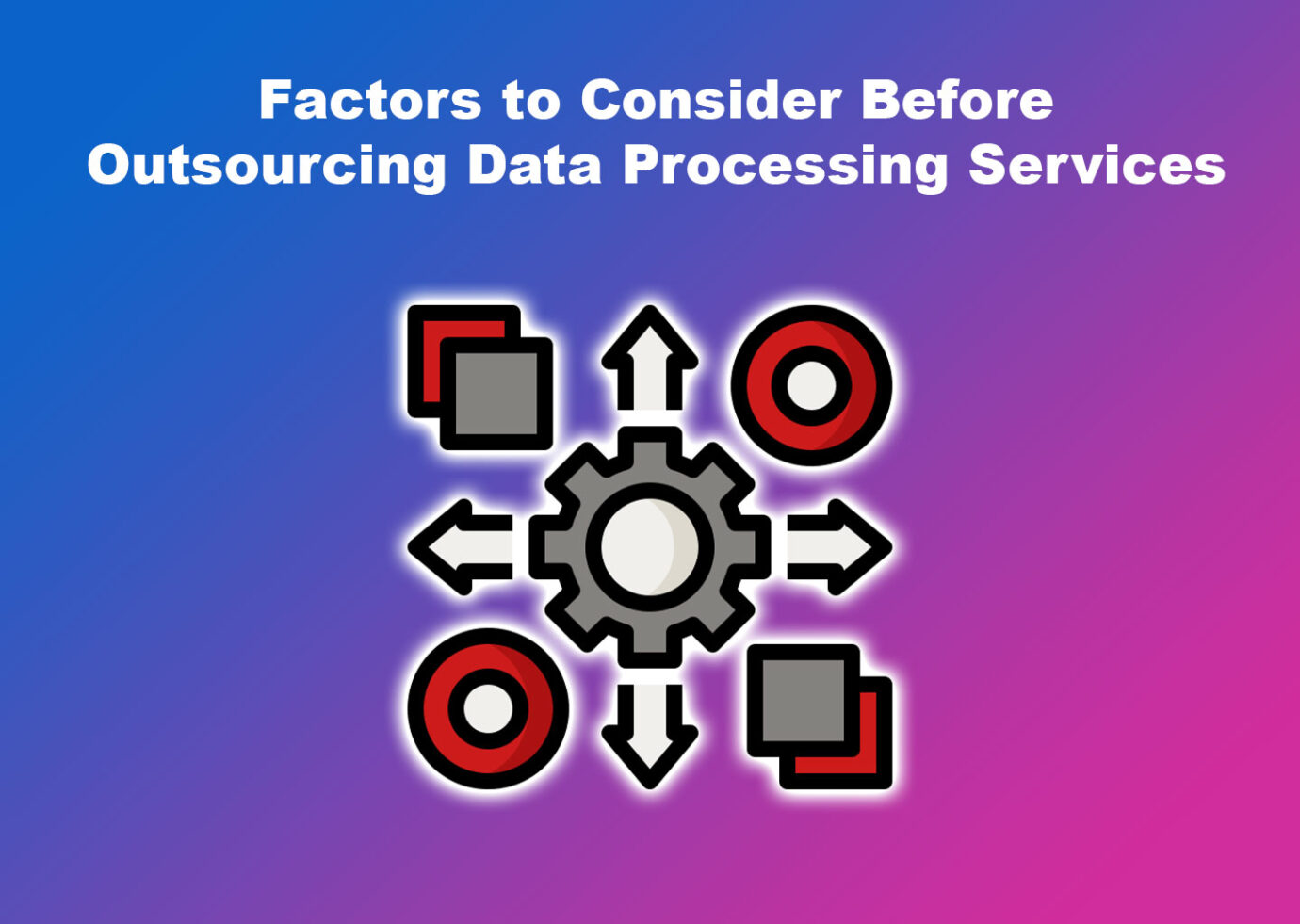
Some significant risks of hiring external staff from business processing outsourcing companies are data breaches and outsourcing the wrong people. Fortunately, these risks can be avoided when you know what to consider before hiring external staff.
These are the factors you need to consider before hiring an outsourced data processor:
1. Where to Outsource
When you search for data entry outsourcing service providers, you will come across many professionals who offer their services. This makes finding the right person to outsource difficult.
The first thing you need to figure out when outsourcing a data entry service provider is whether you will hire a freelancer or an agency-managed professional:
- Freelancer.
Hiring a freelancer is ideal if they will only handle simple data. - Agency-Managed Professional.
Outsourcing from business processing companies is ideal if you need them to handle sensitive information. Company staff is more tied to laws than freelancers, so you can better protect your data.
2. Cost Effectiveness
Will you save more money by hiring external staff than an in-house one? If your answer is yes, then outsourcing data entry will benefit you. But if you want all your business processes to stay inside your company, hiring in-house data entry processors is a better choice for you.
Whatever your choice, your outsourced data processors can deliver high-quality output within your given time frame.
3. The Service-Provider’s Expertise
Before outsourcing data to external staff, you should evaluate whether their knowledge and skills match your business needs. While they may still need training, the data entry service provider you will outsource must already have an idea about the nature of your business.
This way, they can easily understand the needed data and turn it into something that will benefit your business. Hiring someone with expertise in your business sector will also reduce the need for training.
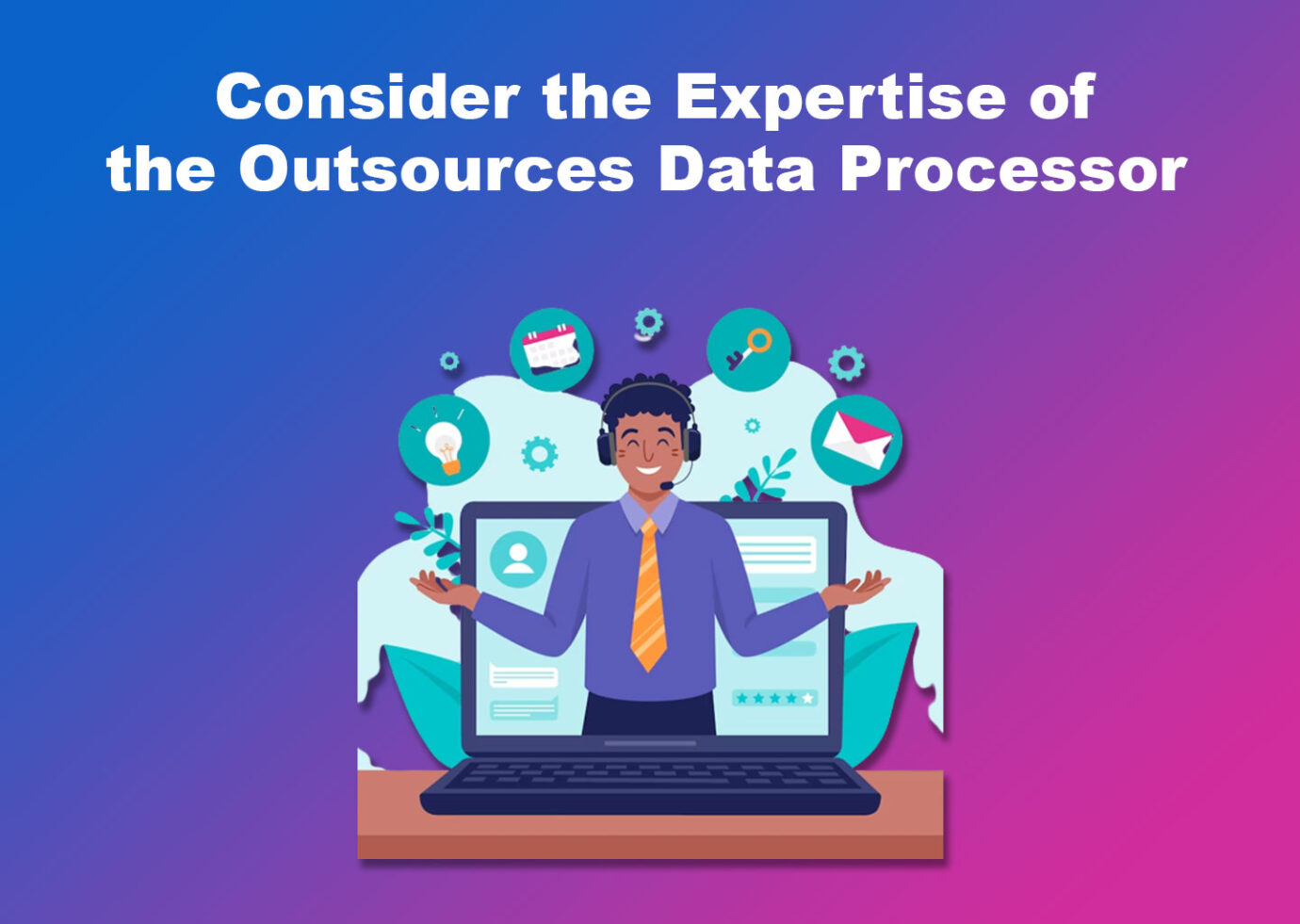
4. Data Security
Before outsourcing a data entry service provider, whether they are a freelancer or from a company, you need to make sure that your data is secure. If you are outsourcing a freelancer, you must prepare a non-disclosure agreement (NDA) that contains all the protocols they need to follow.
Meanwhile, if you outsource from a company specializing in data entry jobs, you first need to know their data security protocols. The tighter their protocols, the less likely a data breach will happen.
Outsourcing a data entry and processing service provider means entrusting them with your business’s data. For this reason, you need to make an intelligent choice of not hiring anyone before you are sure they will not leak sensitive information.
5. Flexibility & Quality Assurance
The data entry and processing service provider you will outsource should be flexible enough to expand or decrease workload based on your business’s demands. When you designate data entry to a flexible clerk, you will receive high-quality outputs.
If your data entry needs increase, a flexible data processor can increase their output without sacrificing quality.
6. Turnaround Time
An organization with vast data entry tasks will benefit from the help of outsourced data processors. The services of these experts are especially beneficial to time-sensitive businesses like logistics and healthcare.
Outsourcing data entry and processing to experts is beneficial if you need your business’s data processing done quickly. So, before outsourcing anyone, let them know your turnaround time requirement to see if they can cater to it.
LinkedIn also has a list of Factors Businesses Should Consider Before Outsourcing Data Processing Services.
How to Ensure the Security of Outsourced Data
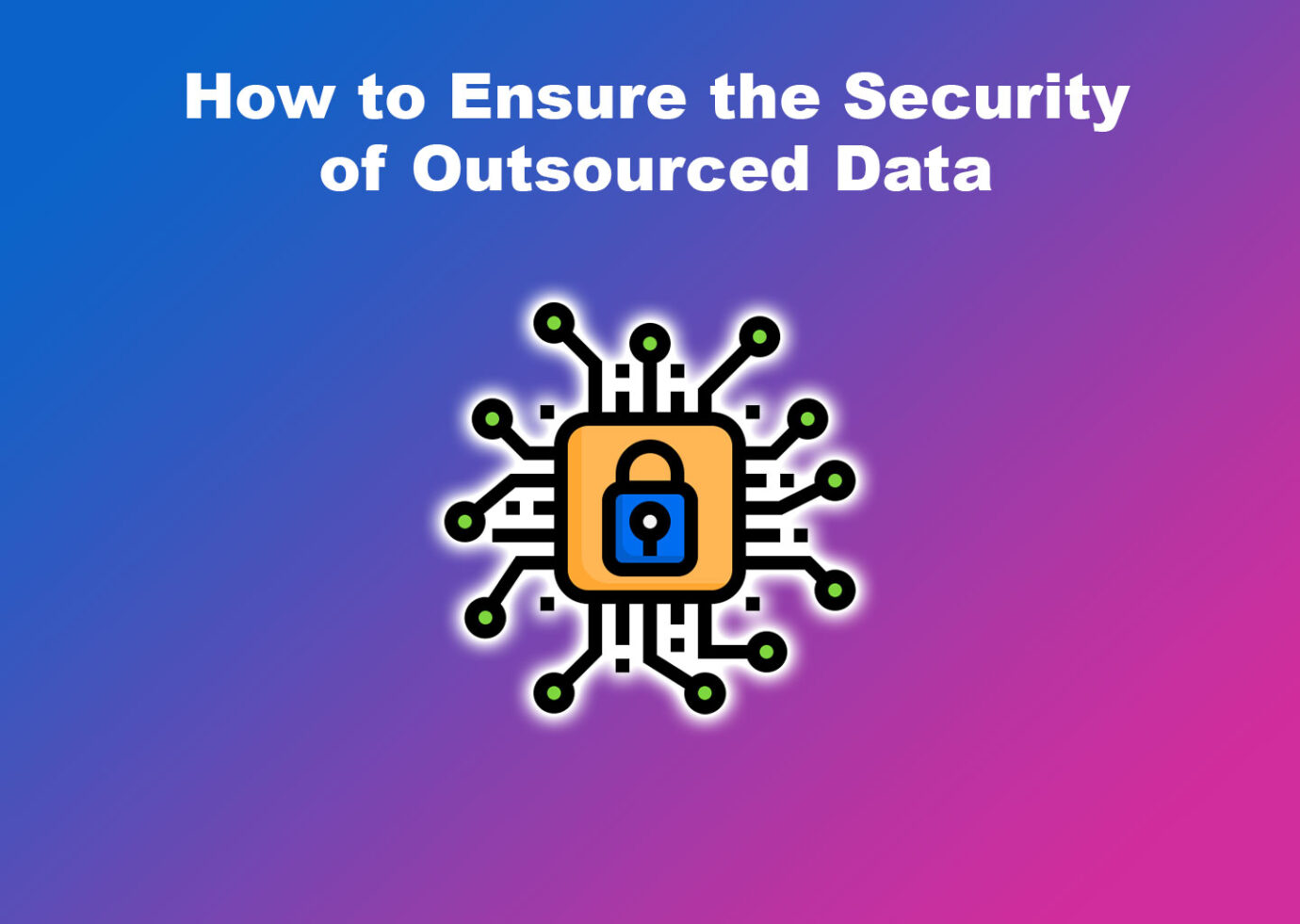
Outsourcing data processing service providers has its benefits and drawbacks. While these drawbacks may scare you from making a decision, they cannot outweigh the benefits if you secure your business’s data.
Here are three steps to ensure the security of your business’s outsourced data:
1. Outsource a Reliable & Reputable Service Provider
The first step to ensuring outsourced data security is to choose a reputable data processor.
If you are outsourcing a freelancer, look for reviews and ratings about them on the website where you found their profile. Websites like Upwork and LinkedIn allow clients to leave reviews on a freelancer’s profile, so you’ll find out if they can handle their jobs appropriately.
If you are outsourcing from a company, choose one that has been in the industry for quite a while. A company that’s been running for years often has reliable security protocols.
2. Prepare a Non-Disclosure Agreement
A non-disclosure agreement legally binds outsourced data processors to a confidentiality contract. When the other party signs the deal, they must keep the information about your company and the data they are handling undisclosed.
An NDA aims to protect a business’s confidential information, such as the data entry outsourced, from potential breaches and unauthorized accesses.
3. Secure Data Storage
Ensure that your outsourced data processing service provider has secure data storage processes before sharing sensitive data with them. Provide the data processor with a database with security measures that only you can control.
Outsourced data should be stored in protected and encrypted servers to prevent information leaks.
4. Implement Multi-Factor Authentication
Besides having secure data storage, multi-factor authentication is a foolproof way of protecting outsourced data.
Multi-factor authentication (MFA) is a verification method that only allows outsourced data processors to access your data storage once they provide several verification factors. Instead of simply logging into a database using a username and password, MFA requires additional verification factors, making it a secure access management policy.
What Are the 5 Parts of Data Processing?
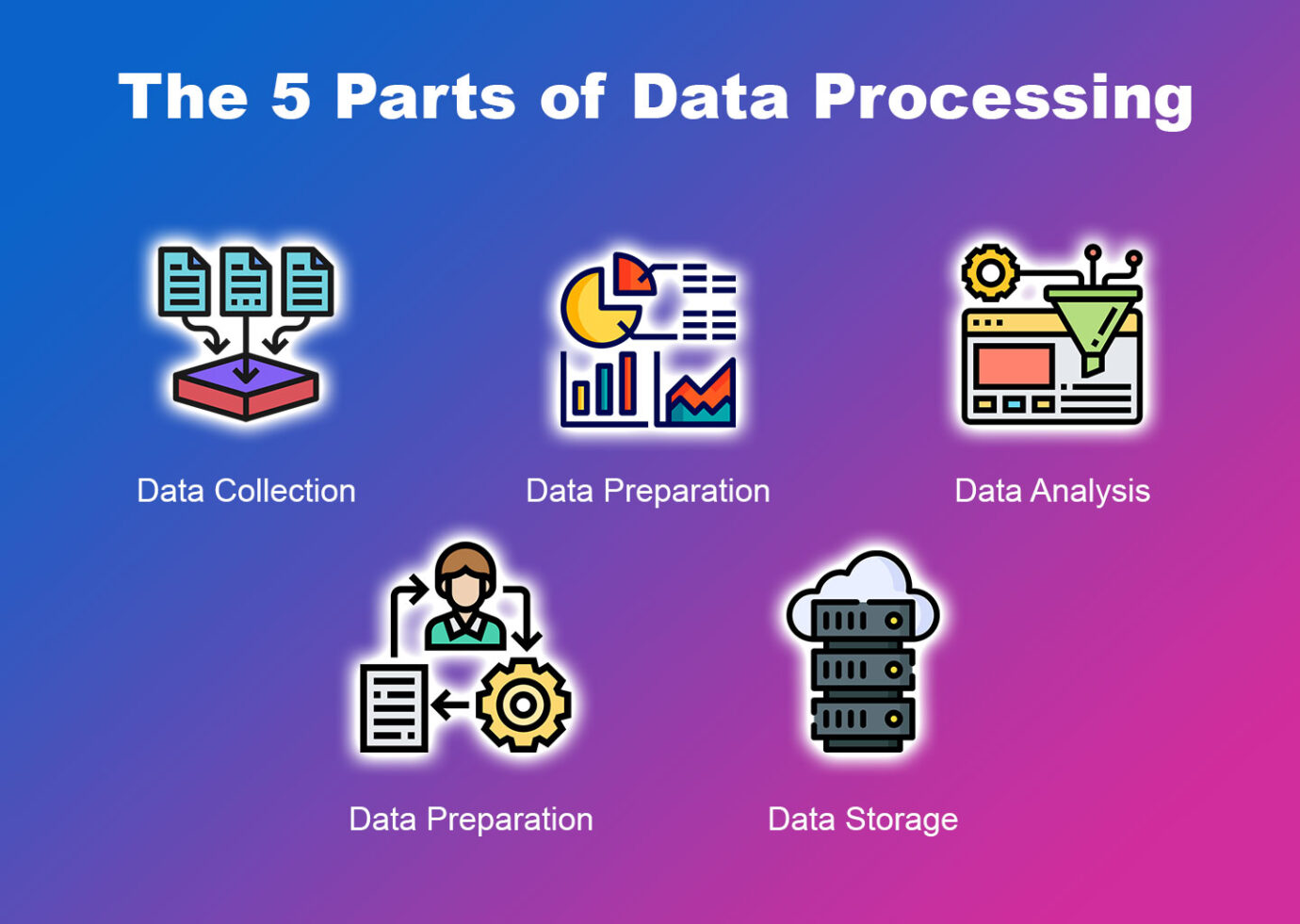
As a business owner, you must know how your outsourced data entry service provider processes data. To ensure that you and the person you outsourced are on the same page, you must ensure that they follow the data processing parts.
Here are the five parts of data processing:
- Data Collection.
Collecting raw data from different sources is a vital part of this. Data can be collected through online forms, surveys, and questionnaires, among other methods. - Data Preparation.
After collecting data, the next step for your outsourced service provider is to prepare it. This involves removing inconsistencies, errors, duplicates, and irrelevant information to ensure compatibility with your requirements. - Data Processing & Analysis.
This is the most critical part of data processing. The cleaned data should be analyzed and processed to develop meaningful insights your business can use for its benefit. - Data Output.
After analyzing the data gathered, the outsourced service provider must present it comprehensibly. Sometimes called data output, the prepared data can be shown as graphs, text, or plots. - Data Storage.
After data processing, it should be stored in data repositories for future use. This process involves organizing, indexing, and archiving processed data for easy retrieval.
Are you a VA who’s aiming to become a data entry keyer? This article can help you become one!
Outsourcing Data Processing Services Is Advantageous
Outsourcing a data processor is advantageous for businesses despite the initial complexities. A data processor lets you and your in-house team focus on more important business aspects.
True enough, finding the right person to do the job and preparing your data storage can be time-consuming.
Entrusting business data to someone from outside your company is also risky. However, with proper security measures, the benefits of outsourcing data processors outweigh the risks.
